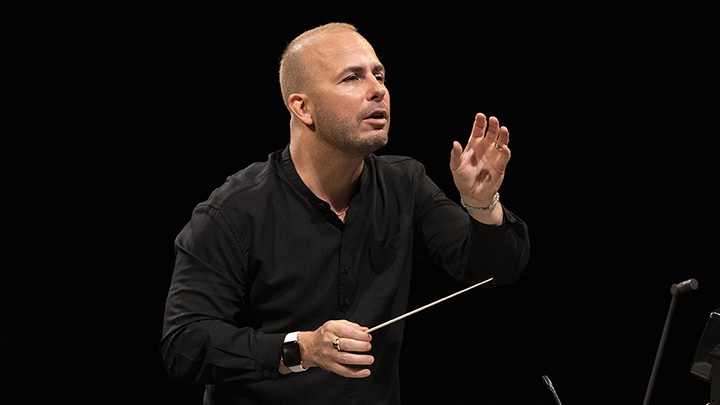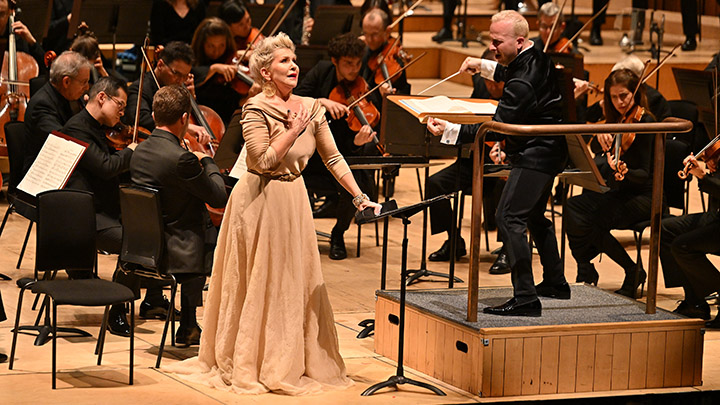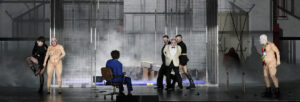As if this was insufficient good news to merit a press release, the announcement provided enticing details on future productions, Met premieres, and upcoming roles for Lise Davidsen. The announcement also noted that the Maestro would be conducting four or five operas per season over the course of his contract.
When he was first named as the next music director back in 2018, the Met asserted that he would conduct a minimum of five operas per season. What are we to make of this seemingly diminished conducting commitment? Admittedly, that announcement was from pre-pandemic times when the Met had more productions per season. However, it does raise the question of how much time the Met’s music director should spend with the orchestra. And while we’re on the topic of Maestro Nézet-Séguin, how do we think the orchestra is faring under his stewardship?
Any music director at the Met is going to be judged against the mythos of the James Levine era. If one goes by the comments on any article about the Met on the New York Times website, Levine transformed a mediocre pit band into one of the world’s great orchestra’s through his ceaseless, selfless devotion to the orchestra. If he had spent less time with the orchestra each season, it would not have risen to the level experienced during the best years of Levine’s reign. Recorded evidence suggests that the Met already had a very fine, if overworked, orchestra when James Levine began his conducting duties in 1971. Of course, we will never know how well the orchestra would have fared without Levine’s predatory behaviors, cult of secrecy, and cock-blocking the podium from any baton of note.
I will admit that the orchestra played exceptionally well during the peak years of his tenure. The playing had a distinctive warmth, characteristic sound (thanks to the divided violins), unanimity of execution, and keen attention to the performers on stage. I do think this can be ascribed to Levine’s priorities as a conductor, his long incumbency at the orchestra, and the stability of the orchestral ranks over time. In the last decade of his tenure, things fell off significantly as Levine’s infirmities and low-energy leadership compromised too many performances.
It was the newer members of the conducting roster that gave us the memorable evenings during that time. Nézet-Séguin’s first two outings leading new productions of Carmen and Don Carlo were particularly impressive. He brought passion, dramatic sweep, and a near-telepathic connection to the singers. His ability to attract the audience’s focus and attention was quite impressive. I still recall the electric hush in the audience during the Don Carlo.
To me, his more recent performances have been less consistent. Nézet-Séguin is still alert, extremely engaged, and sensitive to the singers’ needs, but the orchestra has become more tentative – particularly in the concerts at Carnegie Hall (the perspective on Carnegie is the opinion of people I trust as I have foregone those performances of late). The intentions he indicates on the podium aren’t always realized in the actual playing as consistently as they were in the past.Turnover has been high since the pandemic and the orchestra needs time to settle in. More time with the Music Director would certainly accelerate that process. Alas, that is not to be. Most modern conductors split their time across too many ensembles, holding simultaneous principal conductor and principal guest conductor roles. I worry that we have too many conductors that don’t focus on refining or building their orchestras.
It also tends to homogenize the style and sound of the major ensembles. Looking across a range of opera companies, it seems to be the norm for the principal conductor to lead only a few productions each season. Perhaps with the recording industry’s decline, their managers are driving them to adopt these far-flung schedules to increase exposure. This can’t be healthy for the conductors or their orchestras long term.
With that in mind, is there someone else who should be the Music Director at the Met? There are conductors I admire in specific works, but there are very few with the range and commitment to new works that we need for a Met Music Director. Let us know who you propose as alternate universe music director.
Photos: Richard Termine and Mark Allan





